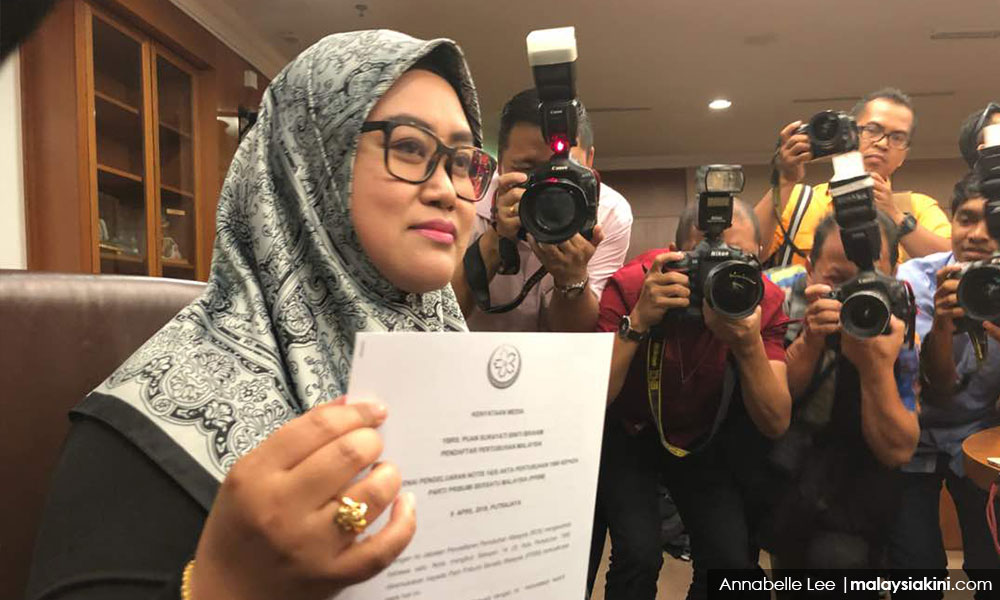
Section 18C of the Societies Act 1966 states:
“The decision of a political party or any person authorised by it or by its constitution or rules or regulations made thereunder on the interpretation of its constitution, rules or regulations or on any matter relating to the affairs of the party shall be final and conclusive and such decision shall not be challenged, appealed against, reviewed, quashed or called in question in any court on any ground, and no court shall have jurisdiction to entertain or determine any suit, application, question or proceeding on any ground regarding the validity of such decision.”
Section 18C does not apply to the decision of the Registrar of Societies but instead applies to the decision of a political party.
Simply put, the decision of a political party on the interpretation of its constitution or on any matter relating to the affairs of the party is final and conclusive and cannot be challenged in court.
It is not the decision of the Registrar of Societies that is final and conclusive that cannot be challenged in court.
In the context of the current Umno party elections' second postponement under Clause 10.16 of its constitution, Section 18C of the Societies Act 1966 does not seem to apply here because this is not a case where Umno's “Majlis Tertinggi” (supreme council) made a decision on the interpretation of Clause 10.16 and informed the Registrar of Societies of its decision. Neither was it a decision on a matter relating to the affairs of the party.
This is a case where the Majlis Tertinggi made an application for extension of time to the Registrar of Societies and sought the Registrar’s approval for an extension under Section 13A (4) of the Societies Act 1966.
The Majlis Tertinggi did not make a decision to postpone but asked for approval to postpone and therefore Section 18C is not triggered into operation.
On June 26, 2015, the Majlis Tertinggi had postponed the party's elections which were due by Oct 19, 2016, which was further pushed to April 19, 2018. This was a decision to postpone party elections as allowed by Clause 10.16 of Umno's constitution.
No approval from the Registrar of Societies would have been necessary. The Registrar of Societies would have just had to have been informed, that's all. At most, the Registrar of Societies would have given an acknowledgement of the decision of the Majlis Tertinggi to postpone.
This decision to postpone would have been final and conclusive. No one could have challenged this decision as it would have been protected by Section 18C of the Societies Act 1966.
However, informing the Registrar of Societies of a decision to postpone is different from asking for the Registrar’s approval for postponement.
In March 2018, the moment the Registrar of Societies entertained the application for approval for further postponement of party elections by the Majlis Tertinggi under Section 13A (4) of the Societies Act 1966, and gave her approval, that process of approval by the Registrar of Societies was subject to review by the courts to see whether that approval was in line with Umno's constitution and whether the Registrar of Societies had the proper jurisdiction to use Section 13A (4) of the Act to grant any extension in the first place.
This is because for an extension to be given by the Registrar of Societies, a deadline must have set in the first place by the Registrar of Societies. April 19, 2018, was not the deadline set by the Registrar of Societies.
It was a date decided by the Majlis Tertinggi, and informed to the Registrar of Societies. So, one wonders how could the Registrar of Societies grant an extension of time she did not set in the first place.
This is why Section 13A(2)(b) of the Societies Act 1966 is very important for the Registrar of Societies because it empowers her to ask for clarification on any ambiguity or vagueness and to provide for greater clarity and preciseness of meaning in any provision of a party’s constitution.
In order to achieve a harmonious reading between Section 13A(2)(b) and Section 18C, the following must be done:
1. The Registrar of Societies can ask for clarification on the interpretation of Clause 10.16 from the Majlis Tertinggi under Section 13A(2)(b); or
2. The Majlis Tertinggi can inform the Registrar of Societies of its decision as to the interpretation of Clause 10.16 under Section 18C.
In this case, neither was done.
It cannot be argued that the ‘decision’ in this case by the Majlis Tertinggi under Section 18C was the decision to apply for an extension of time to the Registrar of Societies.
This is simply because the ultimate decision on the application for extension is made by the Registrar of Societies, which can be reviewed by the Courts. So, either way, Section 18C of the Societies Act 1966 does not come into operation.
Section 18C provides for the control of a party’s internal affairs among party members. They can make a decision and inform the Registrar of Societies of their decision. That decision cannot be reviewed.
As it stands, that is the law and it applies to all political parties. - Mkini



No comments:
Post a Comment
Note: Only a member of this blog may post a comment.